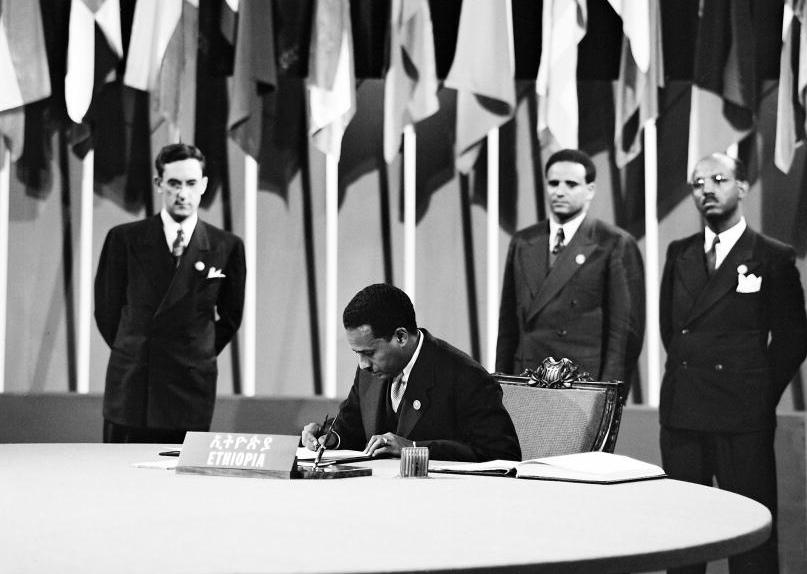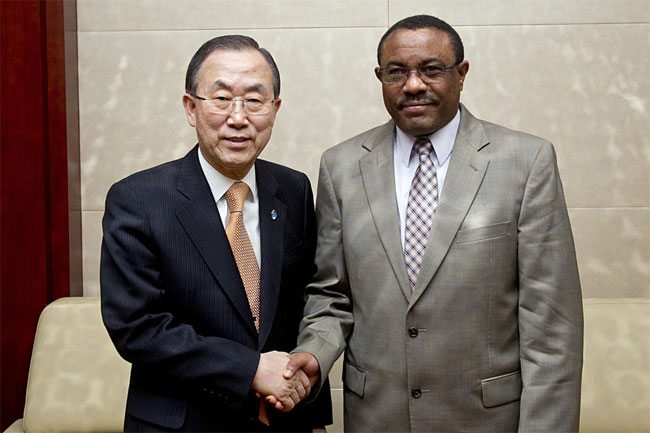This article was originally published in the April 2016 issue of The Ethiopian Messenger, the quarterly magazine of the Embassy of Ethiopia in Brussels.
Ethiopia has officially launched its campaign to secure a non-permanent seat in the United Nation Security Council (UNSC) for the period of 2017-2018. The African Union unanimously supports Ethiopia’s bid to represent the continent in the key international institution for worldwide security.
At a time where global security challenges abound and where the UN, and particularly the UNSC, needs structural reforms, Ethiopia’s solid record of continued contribution to the maintenance of international peace and security will certainly make a valuable addition to the Council and give a stronger voice to Africa on the world stage.
Commitment to multilateralism
Ethiopia’s belief in multilateralism is as old as the concept itself: as early as 1923, Ethiopia became a member of the League of Nations and was one of the 51 pioneer countries that founded the United Nations in 1945, at a time where the vast majority of African countries were still subjugated by colonial powers.

On the continent level, Ethiopia has always been a firm believer in bringing African countries together to guarantee peace on the continent. In 1963, Ethiopia played a critical role in the establishment of the Organization of African Unity, today the African Union, and has been hosting the African organization for more than 50 years. Moreover, Ethiopia more than fulfills one of the most important criteria for non-permanent seat in the Security Council stated in Article 23(1) of the Charter of the United Nations, which stipulates that “due regard should specifically be given, in the first instance, to the contribution of member states of the United Nations in the maintenance of international peace and security”.
Throughout the years, Ethiopia has indeed demonstrated an unshakable commitment to collective security. Even though the country was abandoned by the Leagues of Nations when attacked by fascist’s Italy in 1935, the country has always responded to UN calls for collective action. Since the creation of the UN, Ethiopia has participated in dangerous missions, often taking the lead when other countries did not dare sending their soldiers. For example, Ethiopia sent peacekeeping troops in the civil war of Liberia, for which Ethiopian troops serving with the United Nations Mission in Liberia (UNMIL) were presented with UN Peacekeeping medals for their “invaluable contribution to the peace process” in November 2007.
The country also deployed a battalion in Rwanda from August 1994 to July 1995, in the immediate aftermath of the genocide, to help bringing peace and stability in the devastated country. Ethiopia’s most recent peacekeeping deployments have all been in the Sudans: to the UN Mission in Sudan (UNMIS), the UN-AU Hybrid Mission to Darfur (UNAMID), the UN Mission in South Sudan (UNMISS), and the UN Interim Security Force for Abyei (UNISFA). Outside of the UN, Ethiopia’s major significant deployment is in Somalia, where it maintains troops supporting Somali Government in the framework of the African Union Mission in Somalia (AMISOM). Ethiopia’s involvement in UN peacekeeping missions includes Ivory Coast, Burundi, Sierra Leone, and the list goes on.
Since the time of its first participations in the Korea war (1950-1953), Ethiopia involvement has deepened and improved. With a total of 8,326 peace-keepers deployed in some of the world’s most dangerous conflicts, Ethiopia currently ranks first in Africa and second in the world for its contributions to UN peacekeeping operations.
But the country’s involvement in peace and security goes beyond contributing troops. For years, Ethiopia has played a constructive role in the search for peaceful resolution of the conflicts that have affected the Horn of Africa, by making every effort to help restore peace and promote stability in Somalia and fighting terrorism in the region within the framework of the African Union. As Chair of the IGAD, Ethiopia was highly involved in the mediation efforts between the rival parties in South Sudan, which led to the signing of a peace agreement in August 2015.
A voice for Africa

The UNSC has fifteen members consisting of the five permanent members with veto power and 10 non- permanent members, which are
elected every two years and still yield important powers, as they get to vote, and have a say in major worldwide security issues.
Thanks to the AU’s enforcement, Ethiopia is running on a clean slate for the one seat allocated to the African Group in June 2016, and if elected, the country will certainly live up to African expectations. Ethiopia has been a constant advocate for Africa, consistently making sure the continent’s interests would be taken into account on the international stage on important issues such as migration, counter terrorism, climate change, sustainable development and poverty reduction.
Ethiopia’s participation would also help to fix the fundamental imbalance of the world’s security architecture: whereas some countries have spent several years in the UNSC, more than 60 United Nations Member States have never been Members of the Security Council.
Although a founding member of the United Nations, it should be noted that Ethiopia has served in the Council only twice in 70 years: the first time, in 1967-1968, at the time of the Empire, and the second time in 1989-1990, during the last years of the Derg’s regime. This means that despite its efforts and commitment, the Federal Democratic Republic of Ethiopia was not yet involved in the key decision processes of worldwide security. Beyond questions of international balance or fairness, an Ethiopian participation at the UNSC would also prove that the concept of “African solutions to African problems”, promoted by the African Union and supported by the United States and the UN, is more than just a slogan.
As a country which managed to rebuild itself after a civil war and years of military rule, located in one of the most versatile regions of Africa, Ethiopia has against all odds successfully maintained its peace and stability. It is a country whose actions are turned inward as well as outward: its leadership knows very well that no country is an island, and that its own stability is intertwined with that of other countries of the region and of the world.
By voting in favor of Ethiopia, the member states of the United Nations would put on the Council a dedicated member of the international community which has both the strength and the know-how to be an advocate for pan- Africanism and multilateralism, and an international actor with a model and a vision.
Ethiopia will spare no efforts to promote world peace and security through dialogue and peaceful settlements of disputes and advocate the prevention of conflicts by strengthening all tools available at the UN, while promoting greater cooperation between the UN and regional and sub-regional organizations. Faithful to its decades-long principles, the country will also enhance the role of regional and sub-regional institutions in improving collective security and contribute to the strengthening of United Nations Peacekeeping Operations by addressing the many challenges they face in our ever-changing global security environment.
This is important to consider in these trouble times, as the question of a transformation of multilateral institution is becoming increasingly important and that security challenges become more and more global, as proved by the rise of the Islamic State and the spillovers of regional crises.




